Diabetes and conversational agents: the AIDA project case study
- PMID: 40478072
- PMCID: PMC8456073
- DOI: 10.1007/s44163-021-00005-1
Diabetes and conversational agents: the AIDA project case study
Abstract
One of the key aspects in the process of caring for people with diabetes is Therapeutic Education (TE). TE is a teaching process for training patients so that they can self-manage their care plan. Alongside traditional methods of providing educational content, there are now alternative forms of delivery thanks to the implementation of advanced Information Technologies systems such as conversational agents (CAs). In this context, we present the AIDA project: an ensemble of two different CAs intended to provide a TE tool for people with diabetes. The Artificial Intelligence Diabetes Assistant (AIDA) consists of a text-based chatbot and a speech-based dialog system. Their content has been created and validated by a scientific board. AIDA Chatbot-the text-based agent-provides a broad spectrum of information about diabetes, while AIDA Cookbot-the voice-based agent-presents recipes compliant with a diabetic patient's diet. We provide a thorough description of the development process for both agents, the technology employed and their usage by the general public. AIDA Chatbot and AIDA Cookbot are freely available and they represent the first example of conversational agents in Italian to support diabetes patients, clinicians and caregivers.
Supplementary information: The online version contains supplementary material available at 10.1007/s44163-021-00005-1.
© The Author(s) 2021.
Conflict of interest statement
Competing interestsOne of the authors, Fabrizio Pieraccini, is employed in Novo Nordisk Spa and had a direct role in the creation and promotion of the AIDA project. Francesca Alloatti and Alessio Bosca are part of H-FARM Innovation, the company that developed the agents. Francesca Alloatti is also affiliated to the University of Turin, as is Luigi Di Caro. The University has no interest to declare.
Figures






Similar articles
-
Why people download the freeware AIDA v4.3a diabetes software program: a proof-of-concept semi-automated analysis.Diabetes Technol Ther. 2003;5(3):477-90. doi: 10.1089/152091503765692027. Diabetes Technol Ther. 2003. PMID: 12828835 Review.
-
Usage of the www.2aida.org AIDA diabetes software Website: a pilot study.Diabetes Technol Ther. 2003;5(1):75-89. doi: 10.1089/152091503763816490. Diabetes Technol Ther. 2003. PMID: 12725710
-
The Effectiveness of Artificial Intelligence Conversational Agents in Health Care: Systematic Review.J Med Internet Res. 2020 Oct 22;22(10):e20346. doi: 10.2196/20346. J Med Internet Res. 2020. PMID: 33090118 Free PMC article.
-
Why are people downloading the freeware AIDA diabetes computing software program: a pilot study.Diabetes Technol Ther. 2002;4(6):793-808. doi: 10.1089/152091502321118810. Diabetes Technol Ther. 2002. PMID: 12685803
-
British Diabetic Association review of the AIDA v4 diabetes software simulator program.Diabetes Technol Ther. 2004 Feb;6(1):87-96. doi: 10.1089/152091504322783477. Diabetes Technol Ther. 2004. PMID: 15000776
References
-
- Pereira J, Diaz O. Using health Chatbots for behavior change: a mapping study. J Med Syst. 2019;43:135. 10.1007/s10916-019-1237-1. - PubMed
-
- Introduction: standards of medical care in diabetes—2020. Diabetes Care. 2020;43(Supplement 1):S1–2. - PubMed
-
- Holman RR, Paul SK, Bethel MA, Matthews DR, Neil HAW. 10-year follow-up of intensive glucose control in type 2 diabetes. N Engl J Med. 2008;359(15):1577–89. http://content.nejm.org/cgi/content/full/359/15/1577. - PubMed
LinkOut - more resources
Full Text Sources
Other Literature Sources
